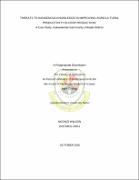| dc.description.abstract | The study was conducted in Kabasekende Sub- County, Kibaale District to examine the threats
to indigenous knowledge in improving agricultural productivity in crop production. The specific
objectives of the study were; to determine the ways in which IK is used in farming systems, to
determine the benefits that farmers get from using IK in their farming systems, to establish ways
by which IK used by farmers is losing its centrality in agricultural productivity and to suggest
mechanisms of ensuring the IK survival and maintenance of its central position in farming in
Kabasekende Sub-county.
Data was collected using interview guides. The study used a sample size of 96 respondents. At
the end of the study, it was confirmed that farmers were still using IK in Livestock to manage
parasites and diseases and selection of breeds. In crop production IK is still instrumental in
selection of seed, determining seasons, control of pests and diseases, harvest and harvest
handling and ensuring safety of produce.
Additionally, IK was reported beneficialinreducing on the costs of buying chemicals and
maintaining soil fertility, recycling of farm resources, controlling pests and diseases, avoiding
pollution of the environment, promoting the use of locally based resources in agricultural
production, resiliency to climate change, maintenance and conservation of crop genetic diversity,
increasing food security at house hold level and promoting life-support ecosystem services.
The study established lack of scientific proof , indigenous knowledge generated by farmers was
becoming more difficult to share freely, IK lacked power at the global scale, employment
opportunities provided a varied influence on knowledge produced by farmers, continual death of
elders without passing on knowledge to the young ones and young people were growing up in a
world of globalization as ways by which IK used by farmers was losing its centrality in
agricultural productivity and respondents identified.
Further the study established that individuals and communities should be supported to document
the IK they possess record but also use it for future generations. Innovators of IK should own
xiii
patents, sensitization and awareness on the value of indigenous knowledge, establishment of
community resource centers for indigenous knowledge and integration of IK into the school
curriculum where culturally and educationally is appropriatedas mechanisms of ensuring IK
survival and maintenance of its central position.
The study thus recommended that there was need to understand the major factors that contribute
to indigenous knowledge production and how it‘s used within the farming communities, if it is to
be sustained for future development. Development programs need also to be tailor-made to suit
specific situations and places, thereby increasing the likelihood of their success. They should
embrace IK in practice and theory in their programs. IK to gain much power and be sustained
for generation there is a need to be published. There is a clear need to weigh the positive
contributions of indigenous knowledge against their negative ones, in the sense that, for many in
Africa, the use of indigenous knowledge has not necessarily transformed their lives as compared
to modern technology. | en_US |


